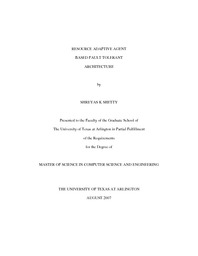
ATTENTION: The works hosted here are being migrated to a new repository that will consolidate resources, improve discoverability, and better show UTA's research impact on the global community. We will update authors as the migration progresses. Please see MavMatrix for more information.
Show simple item record
| dc.contributor.author | Shetty, Shreyas | en_US |
| dc.date.accessioned | 2008-04-22T02:41:28Z | |
| dc.date.available | 2008-04-22T02:41:28Z | |
| dc.date.issued | 2008-04-22T02:41:28Z | |
| dc.date.submitted | August 2007 | en_US |
| dc.identifier.other | DISS-1841 | en_US |
| dc.identifier.uri | http://hdl.handle.net/10106/675 | |
| dc.description.abstract | Pervasive environment consists of increasing number of mobile, tiny and heterogeneous devices communicating through interconnected network. As ubiquitous computing has seeped into various aspects of everyday life, there has been an increasing demand for dependable systems. However providing reliability demands fault tolerance mechanisms that require substantial time and resources. The dynamic nature and the uncertainty associated with pervasive systems coupled with the energy constraints of the devices involved makes fault tolerance a challenging task. In general, the techniques used to provide fault-tolerance are based on having redundancy and duplication of the user tasks. However the additional cost and the low resource availability will prohibit implementation of such fault tolerance methodologies for a pervasive environment. The traditional fault detection and recovery techniques need to be modified to make it applicable in a pervasive environment.
Pervasive Information Community Organization (PICO) is a framework consisting of software agents, called delegents that perform services on behalf of users and devices. In the PICO framework computing community of collaborating delegents is formed to carry out application-specific services. PerSON (Service Overlay Network for Pervasive Environments) provides the service overlay network for the implementation of the community computing concept introduced in PICO. PerSON uses the device model proposed in PICO and provides an overlay network which abstracts the details of service creation, discovery and utilization in a pervasive environment. In this thesis we have developed a Resource Adaptive Agent System (RAAS) which is integrated with PerSON to enhance and facilitate the services provided by PerSON. To deal with the dynamic nature and make best use of resources available in a pervasive environment, RAAS adds features like fault tolerance, checkpointing and resource aware distribution of user requests to PerSON. RAAS not only provides reactive measures to failures, but also proactively deals with the probable future failures and if required performs reassignment of user task from the recently saved checkpoint.
Demonstration applications that perform data intensive tasks have been developed and tested on RAAS. For a set of tasks, energy savings of about 40% was achieved by adding the resource adaptiveness feature to PerSON. The energy savings achieved is proportional to the size of tasks and is subject to the devices available in the environment. | en_US |
| dc.description.sponsorship | Kumar, Mohan | en_US |
| dc.language.iso | EN | en_US |
| dc.publisher | Computer Science & Engineering | en_US |
| dc.title | Resource Adaptive Agent Based Fault Tolerant Architecture | en_US |
| dc.type | M.S. | en_US |
| dc.contributor.committeeChair | Kumar, Mohan | en_US |
| dc.degree.department | Computer Science & Engineering | en_US |
| dc.degree.discipline | Computer Science & Engineering | en_US |
| dc.degree.grantor | University of Texas at Arlington | en_US |
| dc.degree.level | masters | en_US |
| dc.degree.name | M.S. | en_US |
| dc.identifier.externalLink | https://www.uta.edu/ra/real/editprofile.php?onlyview=1&pid=194 | |
| dc.identifier.externalLinkDescription | Link to Research Profiles | |
Files in this item
- Name:
- umi-uta-1841.pdf
- Size:
- 611.5Kb
- Format:
- PDF
This item appears in the following Collection(s)
Show simple item record


